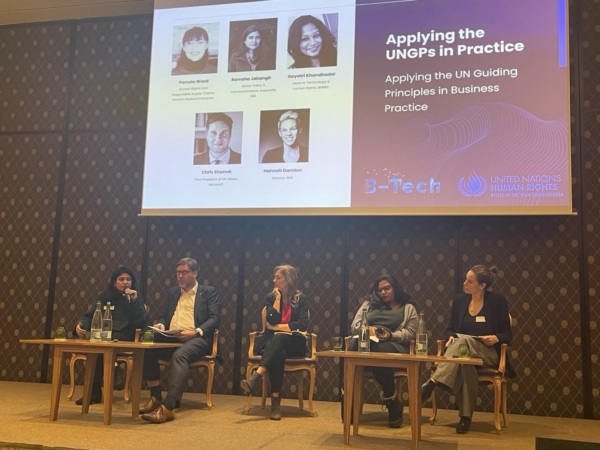On November 30, the UN B-Tech Project, with the support of Shift and BSR, convened stakeholders from industry, government, academia, civil society, and investors at the Generative AI Summit: Advancing Rights-Based Governance and Business Practice in Geneva. The Summit was grounded by the recently released B-Tech papers on generative AI and human rights, which explore the value and practical use of the UNGPs and existing human rights-based approaches to identify, assess, and address the impacts of generative AI. Led by B-Tech, the resource is developed with support from BSR, Shift, and GNI.
In his opening remarks at the Summit, the UN High Commissioner for Human Rights Volker Türk acknowledged the wide recognition of the need for AI governance, noting that multiple policy initiatives underway were mostly inconsistent, and frequently failed to give human rights the appropriate emphasis. Participants at the Summit offered their reflections on the specific ways that the UNGPs could add value to business practice and public policy; the barriers and opportunities to integrating the UNGPS; and how both developers and deployers of Generative AI could and should use the UNGPs to address pressing challenges and guide action.
Also Read: GNI-B-Tech workshop on AI, Human Rights, and the Evolving Regulatory Environment
While the UNGPs are applied across industries worldwide, application within the tech sector presents novel and nuanced challenges, particularly in the context of rapidly evolving technologies. GNI’s Senior Policy and Communications Associate, Ramsha Jahangir, participated in a panel titled “Applying the UNGPs to Generative AI in Practice” to inform the conversation on human rights due diligence in the Gen AI context and the importance of stakeholder engagement across the AI cycle. The session explored the realities of prioritising risks for Gen AI products, consideration of the full value chain of AI technologies, as well as the need for systemic and multistakeholder solutions to Gen AI.

The Summit discussed the foundational B-Tech papers on human rights and generative AI and how it was an essential resource for the practical integration and implementation of human rights considerations into the development, launch, and deployment of generative AI technologies. The resources include:
- A foundational paper that explores the intersection of business, generative AI, and the UN Guiding Principles on Business and Human Rights.
- A taxonomy of generative AI human rights risks that provides a list of the most commonly impacted human rights and specific example risks.
- An overview of current company practice on responsible AI and human rights and how it can be improved.